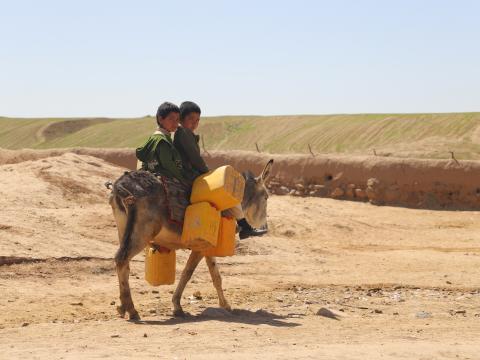Oasis amid the drought

The barren dusty hills of northwestern Afghanistan’s Faryab province stretch far into the horizon. Over the past years, regular droughts and depleting ground water have killed entire harvests. Adding to the catastrophe, people struggling to access clean drinking water have been haunted by water-borne diseases, and even death.
But Shar Shar village is an exception. World Vision’s new solar-powered water purification system (Reverse Osmosis Unit) that pumps salty groundwater from a deep well, which is then filtered into drinking water, has solved the community’s most basic and pressing needs. The area surrounding the village has turned into green farmland, while villagers report to now be living healthier lives, unafraid to drink the new fresh water. It’s an oasis amid the drought.

Hundreds of people - including those from neighbouring villages - use the new reliable source of water. The impact has been visible immediately.
“Now every household has a tap pretty much in front of their homes,” said Nasrullah, a 57-year old father who has grown up in Shar Shar and has himself seen how dangerous untreated water can be. Over the years, he said, he witnessed “many villagers die of waterborne diseases.” Others grew sick, developing chronic stomach issues. “We had no choice,” he said, explaining that, before World Vision’s intervention, it was either dirty water with high salt contents, or no water at all. In Shar Shar, this has previously even complicated farming.
Everything has changed with the newly installed tap water dispenser: “I haven’t seen any diseases,” Nasrullah added. “We’re so happy to have this new system.”
Throughout mountainous Afghanistan, droughts and water shortages are a frequent concern. Climate change has seen reduced snowfall in the country’s central highlands, meaning that spring’s meltwater doesn’t always adequately fill rivers, leaving farmers short of irrigation sources. Hot and dry summers additionally cause dangerous evaporation in both rivers and lakes.
In northwestern Afghanistan where World Vision has been working for more than 20 years, ground water often carries a high percentage of salt, making it unsuitable for both drinking and irrigation. Villagers point to a white salt crust covering the ground where ground water has surfaced, explaining that they aren’t even able to use all of the soil for planting.
After more than four decades of war that has killed thousands of civilians - including countless children - Afghanistan has seen yet another regime change in August. The country has subsequently been sanctioned, while billions of dollars of aid funds have been cut. Many are struggling to survive an economic collapse that has caused widespread hunger and desperation. Thousands have fled, and those who are determined to stay say they need assistance now more than ever.
World Vision is continuing its longstanding work in Afghanistan and has, over the last months, been providing life-saving emergency aid - such as setting up similar water systems to the one in Shar Shar village.
Recently, our staff met Abdul, a 17-year-old teenager living in Herat’s Kushk, a rural district of farmland bordering neighbouring Turkmenistan. Just like in Shar Shar, access to clean water has become one of the community’s main concerns, with a nearby stream the only source of drinking water, used by animals and households alike.

Like most children in the village, Abdul has to work to help his family survive. The responsibility is daunting, but there’s little alternative. Many children help their parents during the plating and harvest season, but Abdul has one sole task: “It’s my duty to fetch water for my family,” he said, explaining that he’d make several trips a day to make sure his family had enough water to drink, clean, and irrigate several small plots of vegetables. “I didn’t go to school because I was always working,” Abdul admitted, saying that he had been eager to study, hoping he’d one day have a job that could help his family. He worries it’s already too late.

Over the years, he has developed a kidney disorder, with doctors linking the condition to regularly drinking contaminated water. He’s in pain most days, and no hospital visit has relieved him of his suffering.
Both conflict and lack of resources made it impossible for the villagers in Kushk to invest in structures for safe water. Rehabilitating a water system costs around US$8,000, while a new purification system - like the one in Shar Shar - is priced at around US$60,000 and can bring benefits to average 4,500 people; large sums of cash in a community where most people barely make US$1/day and often can’t even purchase enough food as prices in the market continue to rise.
World Vision is working closely together with the community in Kushk. With your help, we hope to ensure that children grow up in a safe and healthy environment, setting them up for an abundant life.
(*All names changed to protect people’s identity.)